Hol Dir den wöchentlichen SPARTANAT-Newsletter.
Dein Bonus: das gratis E-Book von SPARTANAT.
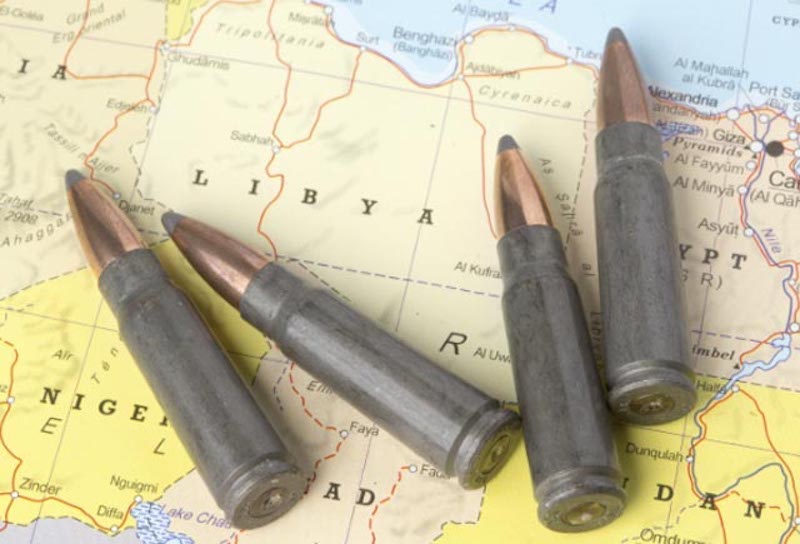
Als Geisel in Libyen (2): Lessons Learned
Der österreichische Alex Sänger (Pseudonym) arbeitete von 2013 bis 2016 als Auftragnehmer für ein Sicherheitsunternehmen in Libyen und wurde zweimal als Geisel genommen. Nach über 10 Monaten in Gefangenschaft erzählt er im Interview von seinen Erfahrungen und "Lessons Learned".
Der Österreicher Alex Sänger (Pseudonym) hat 2013 bis 2016 als Contractor bei einer Sicherheitsfirma in Libyen gearbeitet. Er ist dabei zweimal als Geisel genommen worden, hat einmal 16 Tage und dann über 10 Monate in Gefangenschaft wechselnder Milizen und lokaler Regierungen verbracht. Hier – im ersten Teil des Interviews – hat er uns von seiner Gefangenschaft berichtet. Heute wollen wir von SPARTANAT von Alex wissen, was seine „Lessons learned“ sind. Wie kann und soll man sich als Geisel verhalten?
SPARTANAT: Wie ist es dir im Jänner 2016 bei der Freilassung ergangen?
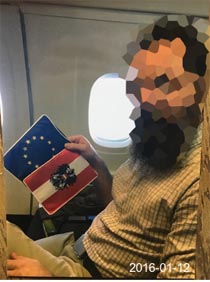 Sänger: Die war sehr chaotisch. Zuerst haben Libyer uns mit einem eigenen Firmenfahrzeug abgeholt, von einem Polizisten mit langem Bart und weissem Jallabia gefahren. Sie habe gesagt, sie bringen uns zum Flughafen. Dann haben sie bei der letzte Ampel vor dem Flughafen noch einmal umgedreht. Dann ging es in die andere Richtung wieder 17 Kilometer quer durch die Stadt, dann wurde wieder umgedreht zurück zum Flughafen. Dort haben wir gewartet, dass ein Charterflugzeug landet und drei europäische Geheimdienstmitarbeiter (von drei verschiedenen Ländern) uns abholen. Vor Ort wurden die letzten Verhandlungen geführt und dann haben sie uns rausgebracht.
Sänger: Die war sehr chaotisch. Zuerst haben Libyer uns mit einem eigenen Firmenfahrzeug abgeholt, von einem Polizisten mit langem Bart und weissem Jallabia gefahren. Sie habe gesagt, sie bringen uns zum Flughafen. Dann haben sie bei der letzte Ampel vor dem Flughafen noch einmal umgedreht. Dann ging es in die andere Richtung wieder 17 Kilometer quer durch die Stadt, dann wurde wieder umgedreht zurück zum Flughafen. Dort haben wir gewartet, dass ein Charterflugzeug landet und drei europäische Geheimdienstmitarbeiter (von drei verschiedenen Ländern) uns abholen. Vor Ort wurden die letzten Verhandlungen geführt und dann haben sie uns rausgebracht.
Was wirklich schade war an dem Tag: ich hatte es geschafft, dass ich, bis auf wenige Tage, wirklich die ganzen 10 Monate Tagebuch führe. Das waren kleine Zettel, die in meiner Jacke versteckt waren. Und ich wollte nicht, dass das noch jemand findet und ich habe die Jacke einem der Dienstmitarbeiter gegeben und gesagt: Nimm die bitte mit ins Flugzeug. Und er hat sie liegen gelassen. Und das ist wirklich Schade, weil mit diesem Tagebuch hätte viele eine Freude gehabt, vor allem die Psychologen. Ich hatte aufgeschrieben, was ich wahrgenommen haben – Kämpfe, die zu hören waren, Jets – aber auch, wie ich selbst mich gefühlt hab. Alle Hochs und Tiefs dokumentiert.
SPARTANAT: Du hast aber an die Freilassung im ersten Moment auch nicht geglaubt?
Sänger: Ich habe die Freilassung erst geglaubt, als ich in Wien vom Flughafen raus bin – und dort keiner auf mich gewartet hat. Das Ganze war wirklich chaotisch, wir haben noch einen Umweg durch halb Europa nehmen müssen, bis wir endlich in Wien angekommen sind. Sehr chaotisch alles.
SPARTANAT: Du hast – auch bedingt durch deine Ausbildung bei einer Spezialeinheit, du warst beim Jagdkommando – eine militärische SERE Ausbildung, die dich auf Gefangenschaft, Verhöre und Flucht vorbereiten soll. Von hinten gesehen: Hat dir das etwas gebracht? Was war gut und wichtig um dich auf eine Situation vorzubereiten, in die du dann wirklich gekommen bist?
Sänger: Die SERE Ausbildung habe ich 2010 gemacht. Ich bin wirklich froh, dass ich sie absolviert habe. Aber auch, dass meine Frau sie ebenfalls mitgemacht hat. Weil ich ihr damals schon gesagt hatte, das ist die Ausbildung und man hört auch, dass dies und das auf die Frau und die Familie zukommen kann. Das heißt die SERE hat nicht nur mir etwas gebracht, sondern extrem viel meiner Frau. Es war wirklich gut, dass sie das alles schon vorher einmal gehört hat, auch was Journalisten betrifft oder dumme Fragen von anderen angeht.
„Das Wichtigste in der Haft ist es, dass man körperlich und psychisch fit bleibt.“
Mir persönlich hat die SERE etwas gebracht, weil ich vorher schon bescheid wusste über die verschiedenen Phasen einer Entführung oder Geiselnahme, die es geben kann. Dass zum Beispiel die Möglichkeit besteht, dass die Geisel permanent weiterverkauft wird. Ganz wichtig ist auch die erste Phase, die Zeit der eigentlichen Geiselnahme. Da sind die Entführer, wie ich auch gesehen habe, besonders nervös. Sie sind auch alle nur kleine Soldaten, die sich selbst nicht auskennen und oft nur einen Auftrag erfüllen. Und dann während der Haft: das wichtigste ist, das Hirn zu trainieren, mit allem was einem einfällt. Nicht nur körperlich, sondern auch psychisch schauen, dass man fit bleibt. Und dann viele Sachen, die ansonsten relativ selbstverständlich wirken: dass man auf die Hygiene achtet, eine graue Maus bleiben soll. Wenn ich verhört werde, nie alles auf einmal hergeben, immer schauen, dass man etwas gibt, aber trotzdem weiterhin interessant bleibt für das Gegenüber. Wenn es etwas zu lügen gibt, so nahe wie möglich an der Wahrheit vorbei lügen.
 SPARTANAT: Von der anderen Seite gesehen: Was waren deine größten Probleme während der Gefangenschaft für dich selbst?
SPARTANAT: Von der anderen Seite gesehen: Was waren deine größten Probleme während der Gefangenschaft für dich selbst?
Sänger: Psychisch gesehen, zu wissen, ob meine Familie versorgt ist. Anfangs auch, ob sie überhaupt etwas wissen von mir. Dann ob sie versorgt sind. Und gegen Ende hin war die Angst: Werden die von Journalisten belauert? Was passiert, wenn ich heimkomme? Werden mich meine Kinder wieder aufnehmen? Und wie groß wird das Interesse von Medien oder Ministerien sein, alles mit Blick auf meine Familie gesehen. Das waren psychisch die größten Probleme.
Körperlich: die erste Gefangenschaft war mit 16 Tagen relativ kurz. Da war das Problem, dass es keine Möglichkeit zum Waschen gegeben hat. Immer dasselbe Gewand an. Die Trinkflasche, die ich gehabt habe, habe ich in der Nacht stets mit meinem Urin gefüllt, für den Fall, dass es nichts zu Trinken gegeben hätte. Während der zweiten Gefangenschaft habe ich sieben Tage starkes Fieber gehabt, da gibt es eine Woche, die wie ausgelöscht ist, da weiß ich nicht, was mit mir passiert ist. Und während der Einzelhaft habe ich Probleme mit den Knien gekriegt, weil ich mich immer hinknien musste, um in die Flasche zu pinkeln. Da hab ich noch immer einen Schorf, ich weiß nicht, was das für ein Dreck am Boden gewesen sein muss. Und ich habe extreme Probleme mit dem Darm bekommen, weil ich den Stuhlgang so unterdrücken musste. Ich hatte da extreme Schmerzen. Mein serbischer Kollege hat die psychischen Sachen so gehabt, wie oben bereits erwähnt, also ein anständige Paranoia. Er hat aber auch 29 Kilo verloren, mit dem Muskelmasseverlust haben sich auch extreme Gelenkschmerzen entwickelt. Er ist damit noch immer in Behandlung.
„Wenn ich weinen musste, habe ich mich unter der Decke versteckt und geschaut, dass keiner etwas bemerkt.“
Eine Sache, die ebenfalls sehr schlimm war, ist, dass ich in diesen sechs Monaten, während denen ich mit den anderen in einer Zelle zusammen war, nie Gefühle habe zeigen können. Wenn ich weinen musste, habe ich mich unter der Decke versteckt und geschaut, dass keiner etwas bemerkt. Aber man ist auch grantig oder würde manchmal auch einfach gerne schreien … Zwischendurch habe ich wirklich geträumt, das erste, was ich tue, wenn ich rauskomme: ich schreie mal laut. Oder ich hau mit der Faust gegen die Wand. Irgendwas. Einfach die Gefühle zeigen. Das war sehr schwierig …
SPARTANAT: Das heißt, defensive Machtlosigkeit ist etwas, das man ich sich rein frisst …
Sänger: Ja. Ich hab nur einmal, ganz in Gedanken, während ich in der Zelle auf und ab gegangen bin, ganz leise gegen die Wand geschlagen. Und auf einmal waren alle still … Und dann sind die Polizisten gekommen und haben mich gleich befragt. Und erst später habe ich über meinen Kollegen erfahren, dass die anderen in der Zelle das hochgespielt haben, als ob ich komplett ausgerastet wäre. Da hab ich dann gemerkt: gar nichts mehr reden. Und nichts tun. Nicht einmal mit dem Fuß aufstampfen. Ansonsten: Inschallah. Allahuakbar.
SPARTANAT: Einfach machtlos. (Pause) Hast du körperlich etwas machen können, um auf dich zu schauen?
Sänger: Ich habe eigentlich jeden Tag Sport gemacht, so gut es ging. Alles was man mit Körpergewicht und auf zweieinhalb Quadratmetern geht. Das war in der Gemeinschaftszelle, wo ich am Anfang gefangen war. Aber das Essen gibt einfach nicht die Energie her, die man am Tag verbrennt, selbst wenn man nur 100 Liegestütz macht. Man wird wirklich so schwach.
Als sie uns dann zusammengelegt haben, hatten wir eine relativ große Zelle, da waren sogar zwei Stufen drinnen, wo man raufgehen konnte. Da haben wir dann beide angefangen zu gehen, das war wirklich unglaublich, mit den zwei Stufen da drinnen. Na super! Das kann man sich nicht vorstellen … (lacht) Ich habe in der Zelle vorher nicht einen Schritt machen können, ohne irgendwo drübersteigen zu müssen. Dann dieser riesen Platz und die zwei Stufen. Wir haben ausgerechnet, der Kollege ist einmal 28 Kilometer gegangen. Im Achter. Dort haben wir jeden Tag ein paar Stunden mit irgendwelchen Leibesübungen verbracht.
Die letzten zwei Wochen hat das nicht mehr funktioniert, weil wir einfach nichts zum Essen gekriegt haben und wir haben sogleich gemerkt, dass nach dem Sport, wenn nichts zu Essen kommt … man spürt wirklich, wie man sich selbst verdaut. Es war noch dazu so kalt und wir hatten das Dilemma, wenn wir uns nicht bewegen, ist es kalt und man zittert permanent, aber wenn man Sport macht, ist es zwar warm, aber man verbrennt noch mehr Energie als beim Zittern.
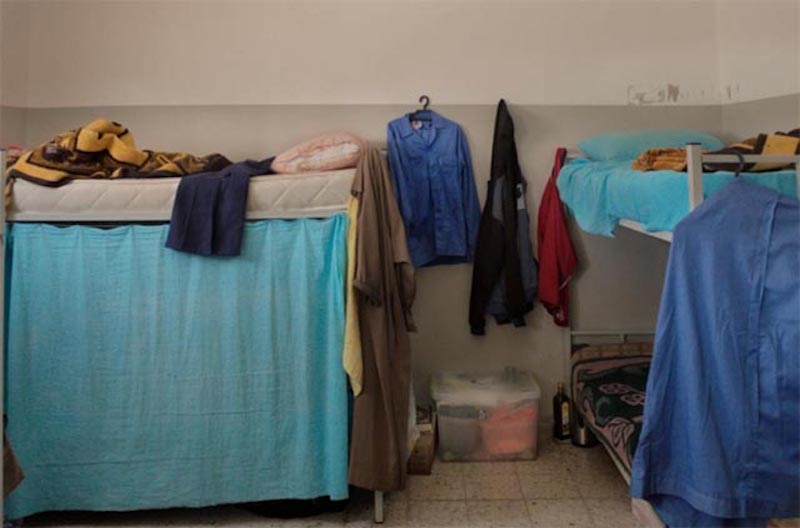 SPARTANAT: Wie hat es mit der Hygiene ausgeschaut?
SPARTANAT: Wie hat es mit der Hygiene ausgeschaut?
Sänger: Bei der zweiten, langen Gefangenschaft waren in der Gemeinschaftszelle Desinfektions- und Putzmittel vorhanden. Was auch gut war, weil wenn elf Leute aufs Klo gehen, will ich nicht wissen, was man sich sonst so einfangen kann. Das Wasser war auch warm, aber nicht weil es Warmwasser gewesen wäre, sondern weil die Leitungen übers Dach gelaufen sind und so tagsüber das Wasser aufgewärmt haben. Und es war Sommer. Damit haben wir warmes Wasser gehabt. In der zweiten Zelle gab es keine Desinfektionsmittel und nur kaltes Wasser. Das merkt man dann auch sehr extrem. Ich weiß bis heute nicht wie die Araber das machen: wenn ich zweimal am Tag kotiere und auswasche, aber nicht abtrocknen kann, da kriege ich einen Wolf.
SPARTANAT: Mit ein paar Monaten dazwischen – was vermutlich nicht so viel Zeit ist –, was sind deine „Lessons Learned“
Sänger: Also von der Arbeit im Sicherheitsbereich ausgehend, in der Position in der ich war oder noch immer bin: Man darf einfach nie sagen, es ist eh alles gut. Ich muss permanent aufgeschaltet sein. Und wenn einem etwas komisch vorkommt, muss man sofort darauf reagieren. Ich bin mir sicher, ich hätte die Situation vermeiden können, wenn ich nicht so überarbeitet gewesen wäre bzw. wenn der Informationsfluss in der Firma besser gewesen wäre. Der war zu dem Zeitpunkt schlecht. Die andere „Lesson learned“: als Österreicher bist allein. Das ist 100prozentig. Ich weiß nicht, ob ich es gesagt habe, aber der ungarische Botschafter hat sich mit unserem Fall befasst.
„Wichtig ist vor allem, dass der Entführte sich offen gibt – Mithäftlingen gegenüber oder wer immer dort ist –, aber niemandem vertraut.“
SPARTANAT: Was würdest du jemandem raten, der in solch eine Situation kommt?
Sänger: Also, ich glaube Allheilmittel gibt es keines. Wichtig ist vor allem, dass der Entführte sich offen gibt – Mithäftlingen gegenüber oder wer immer dort ist –, aber niemandem vertraut. Vertrau absolut niemandem! Es ist egal, ob du siehst, dass einer von der ärgsten Folter zurückkommt, die erste Frage, die er dir stellt, wird er sicher wieder weiter erzählen. Die anderen verkaufen dich für eine Zigarette oder ein Stück Schokolade. Jeder! Angelogen haben uns von den Häftlingen bis zum Generalstaatsanwalt alle. Und ganz besonders wichtig, wenn man ins Ausland geht, in eine „hostile environment“ oder eine „remote area“: Ich muss immer wen haben, der weiß wann ich wo bin bzw. einen, der einen bestimmten Notfallplan hat. Wenn du allein bist, bist du allein. (Pause) Ich hab da keinen super Spruch auf Lager. (Pause) Wie es bei der SERE ist: die graue Maus funktioniert ganz gut.
SPARTANAT: Du hast dich selbst auch auf einen Ausbruch vorbereitet?
Sänger: Der Gedanke an einen Ausbruch war permanent da. Bei der ersten Gefangenschaft haben wir uns ausgerechnet, wie lange wir brauchen würden, um über die Mauer zu springen. Wie weit würden wir kommen? Das war noch am Weg zum eigentlichen Gefängnis.
Dann im Hochsicherheitstrakt hätte es eigentlich keine Chance gegeben rauszukommen. Vielleicht nach einer Verhörphase, aber es ist extrem schwierig, weil man einfach nicht weiß, wo man ist. Die Augen sind ein großes Problem, weil wenn es dauernd dunkel ist, braucht es ein paar Minuten, bis sich die Augen gewöhnt haben, dass man wieder was sieht. Und danach muss man halt entscheiden: Flieht man in Daesch Hände? Oder schwimmt man nach Lempedusa? Viele andere Möglichkeiten hat es nicht gegeben.
Das zweite Mal war ich so vorbereitet auf den Ausbruch, dass ich mir unter den Jogging Anzug, den ich immer an hatte, eine Dschalabia (traditionelles arabisches Gewand) umgebunden hatte, aber so dass es die Mitgefangenen nicht sehen. Und ich hab mir gesagt, wenn sie mich zum Verhör holen, lauf ich davon. Ich habe mir von den vorherigen Verhören genau ausgerechnet, ich brauche 14 bis 15 Sekunden bis zum Tor. Die Guard am Tor hat die Waffen nicht in der Hand bzw. schaut er in die andere Richtung. Selbst wenn ihn von innen wer aufmerksam macht, braucht das, bis er seine Waffe zur Hand hat. Zielen kann er mit hoher Wahrscheinlichkeit sowieso nicht und über das Tor komme ich mit einem Satz drüber. Da habe ich gewusst, dass sich das leicht schaffe. Ich wäre da raus, über das Tor drüber, hätte die erste oder zweite kleine Querstraße genommen, hätte mich dann umgezogen. Eben die Dschalabia anlegen und ich hatte mir Asche vorbereitet, dass ich Bart und Haare einfärben und das Gesicht dunkler machen kann. Mit den Haaren ist das nicht so das Problem, aber mit der weißen Haut fällt man am meisten auf. Vor allem, wenn man im Gefängnis ist, ist man weiß. Wirklich weiß.
Ich bin da nur nicht abgehauen, weil genau bei dem einen Verhör, als ich so weit war, haben sie mich meine Frau anrufen lassen. Und sie war sich sicher und hat mir versichern können, dass das alles eh gleich vorbei ist und dass alles gut ausgeht. Im Nachhinein habe ich mir gedacht: es waren dann noch sieben Monate … (Pause) wäre ich doch nur abgehauen! Weil es ist immer nur schlechter geworden. Ein Punkt ist auch, dass ich damals nicht gewusst habe, dass mein Kollege auch im gleichen Gefängnis ist. Ich habe zu dem Zeitpunkt geglaubt, ich bin komplett allein. Was dann mit ihm passiert wäre, wenn ich abgehauen wäre, möchte ich nicht wissen. Aber wahrscheinlich wäre für ihn das Leben sehr schwierig geworden.
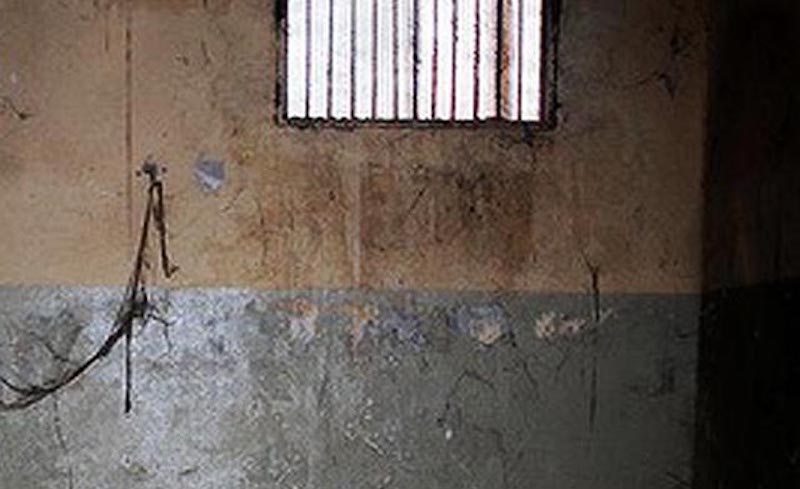 SPARTANAT: Es gibt ja auch keine Garantie dafür, was mit dir passiert wäre, wenn du rausgekommen wärst. Oder?
SPARTANAT: Es gibt ja auch keine Garantie dafür, was mit dir passiert wäre, wenn du rausgekommen wärst. Oder?
Sänger: Das ist das andere. Ich habe die Stadt zwar eigentlich sehr gut gekannt, weil ich dort viel unterwegs war. Ich war mir auch bewusst, wie lange ich zum Beispiel für die ersten zehn Kilometer brauchen würde. Ich hatte mir ausgerechnet, dass ich dafür zwei Tage benötige. Und dann bin ich immer noch in der Stadt. Und mir ist nur ein Ort eingefallen, wo ich hingehen hätte können. Bei allen anderen habe ich nicht gewusst, ob die verhört wurden oder unter Beobachtung stehen. Ich hätte keinen von unseren ehemaligen Mitarbeitern involvieren können.
Und die Möglichkeit, von Tripoli raus nach Tunesien zu kommen, ist gleich Null. Egal ob zu Fuß oder mit Taxi. Da sind so viele Checkpoints und verschiedene Gruppen, bei denen man durch muss … Und alle wollen nur dich. Zu dem Zeitpunkt waren es die Muslimbruderschaft, die ehemaligen Gadaffi-Leute, Anhänger der Regierung in Tobruk, dann ISIS, dann wieder Tobruk-Regierung, dann nochmals Muslim Brotherhood. Also das wäre eine schöne Tourtur gewesen. Zwar nicht so weit, aber unbekanntes Land. Schwierig. Eine Möglichkeit wäre eventuell noch gewesen ein Boot zu nehmen und wirklich mit dem Flüchtlingsstrom mit.
SPARTANAT: Alex, gut dass du wieder nach Hause gekommen bist. Danke für das Gespräch.
HIER geht es zum ersten Teil des Interviews „Die Gefangenschaft“.
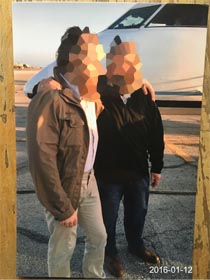 ALEX SÄNGER, Jahrgang 1980, stammt aus Steiermark, war Soldat des österreichischen Bundesheeres, zuletzt beim Jagdkommando. Ab 2013 hat er für die ARGUS Group in Libyen als Personenschützer gearbeitet. Von seiner zehnmonatigen Geiselnahme kehrte er im Januar 2016 nach Hause zurück.
ALEX SÄNGER, Jahrgang 1980, stammt aus Steiermark, war Soldat des österreichischen Bundesheeres, zuletzt beim Jagdkommando. Ab 2013 hat er für die ARGUS Group in Libyen als Personenschützer gearbeitet. Von seiner zehnmonatigen Geiselnahme kehrte er im Januar 2016 nach Hause zurück.
Mehr zum Konflikt in Libyen:
– „Geostrategic Dimensions of Libya’s Civil War“ von Africa Center for Strategic Studies
SPARTANAT ist das Online-Magazin für Military News, Tactical Life, Gear & Reviews.
Schickt uns eure News: [email protected]
Werbung
Hol Dir den wöchentlichen SPARTANAT-Newsletter.
Dein Bonus: das gratis E-Book von SPARTANAT.


